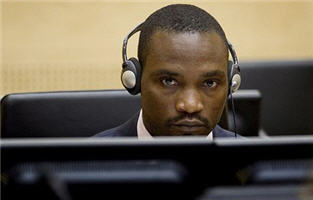
Today, the Appeals Chamber of the International Criminal Court decided by majority, with Judge Kourula and Judge Trendafilova dissenting, to dismiss the appeal of Germain Katanga against the decision entitled “Decision on the Motion of the Defence for Germain Katanga for a Declaration on Unlawful Detention and Stay of Proceedings” of Trial Chamber II of 20 November 2009. Judge Nsereko, presiding judge in this appeal, read a summary of the judgment in open session.
On 30 June 2009, Mr Katanga filed a motion requesting a declaration for unlawful detention and a stay of the proceedings against him for his alleged unlawful arrest and detention in the Democratic Republic of the Congo prior to his surrender to the Court. On 20 November 2009, Trial Chamber II rejected the Defence motion without considering its merits, finding that it was submitted too late, inter alia because the motion was filed seven months after the Trial Chamber’s invitation to the parties to submit any relevant issues on which they sought a ruling of the Chamber.
The Appeals Chamber observed that the Court’s legal instruments underscore the need for diligence and expeditiousness in the proceedings and agreed with the Trial Chamber’s determination that the parties must act “in a timely manner” or within a reasonable time, in keeping with considerations of efficiency and judicial economy. The Appeals Chamber found that the decision of the Trial Chamber did not infringe Mr Katanga’s right to a fair hearing and that he had been given adequate notice and opportunity to raise the issue of his alleged unlawful pre-surrender arrest and detention.
The dissent considered that the Trial Chamber erred when it decided that the Defence motion was inadmissible for having been filed at too advanced a stage in the proceedings. Accordingly, the dissent concluded that the Trial Chamber’s decision should be reversed and remitted to the Trial Chamber for a consideration on the merits.
In reaching this conclusion, Judge Erkki Kourula and Judge Ekaterina Trendafilova found that the Trial Chamber erred in establishing, for the first time in its decision, requirements applicable to the filing of the Defence motion and applying them retroactively to the detriment of Mr Katanga. They also found that the Trial Chamber erred in the exercise of its discretion when it failed to properly balance the factors in article 64 (2) of the Statute, placing too much emphasis on expeditiousness at the expense of the rights of Mr Katanga.
Related articles
- • Moise Katumbi blocked from entering DR Congo (August 3, 2018)
- • Jean-Pierre Bemba named MLC presidential candidate (July 13, 2018)
- • ICC Confirms 14-Year Sentence Against Thomas Lubanga (December 1, 2014)
- • ICC Case Against Bemba Wrapping Up as Another Opens (November 12, 2014)
- • ICC confirms war crimes charges against Bosco Ntaganda (June 10, 2014)
- • ICC sentences Germain Katanga to 12 years (May 23, 2014)
- • At least 60 killed as train derails in Katanga province (April 23, 2014)
- • ICC finds Germain Katanga guilty of war crimes and crime against humanity (March 7, 2014)
- • Rebel Leader Bosco Ntaganda Makes First Appearence Before the ICC (March 26, 2013)
- • Bosco Ntaganda in the International Criminal Court's custody (March 22, 2013)
- • Warlord Bosco Ntaganda Turns Himself In at US Embassy in Rwanda (March 18, 2013)
- • International Criminal Court Acquits Mathieu Ngudjolo Chui (December 18, 2012)
- • The M23 Rebels Want to Overthrow Kabila? Nonsense (November 28, 2012)
- • M23 Rebels Committing War Crimes (September 11, 2012)
- • Kagame May Face War Crimes Charges at the ICC, Says US Official (July 26, 2012)
- • US Cuts Military Aid to Rwanda Over Support to Rebels in DR Congo (July 21, 2012)
- • DR Congo, Rwanda Sign Pact to Fight Rebels in Eastern Congo (July 15, 2012)
- • Thomas Lubanga sentenced to 14 years (July 10, 2012)
- • U.S. Tells Rwanda to Stop Supporting Rebels in DR Congo (July 2, 2012)
- • Kagame Is A Problem for The U.S. and The U.K. (June 23, 2012)
- • ICC Prosecutor Seeks 30 Years for Thomas Lubanga (June 13, 2012)
- • Congo Army Advances On Rebels Holdout, Says Official (June 5, 2012)
- • Rwanda Should Stop Aiding War Crimes Suspect Bosco Ntaganda: Human Rights Watch (June 4, 2012)
- • UN Report Accuses Rwanda of Supporting Bosco Ntaganda Rebels (May 28, 2012)
- • ICC Prosecutor Seeks New Charges Against Ntaganda, FDLR Leader (May 14, 2012)
- • Army Suspends Military Operations Against Ntaganda Loyalists (May 6, 2012)
- • Kabila's Position on The Arrest of Ntaganda 'Has Not Changed' (April 13, 2012)
- • Kabila, Army Chief of Staff head to eastern Congo to deal with defectors (April 10, 2012)
- • DR Congo Government Warns Bosco Ntaganda He May Face Justice (April 6, 2012)
- • Thomas Lubanga found guilty of using child soldiers (March 14, 2012)







